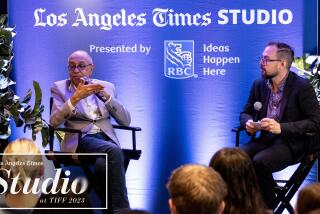PASSINGS: Dennis Cole, Bruce King, Francisco Ayala
- Share via
Dennis Cole
Popular ‘60s TV actor
Dennis Cole, 69, a handsome blond actor who had numerous TV guest-star roles beginning in the 1960s and was married to “Charlie’s Angels” star Jaclyn Smith for a time, died Sunday at Holy Cross Hospital in Fort Lauderdale, Fla., according to publicist Edward Lozzi. The cause was not given.
Cole was born in 1940 in Detroit, where he learned to sing and act. When he arrived in Hollywood, he worked as a stuntman before landing acting roles, starting in the mid-’60s with the TV series “Paradise Bay” and “Felony Squad.”
Over the next few decades, he appeared in the daytime drama “The Young and the Restless” and many prime-time series, including “Bracken’s World,” “Bearcats!,” “Medical Center,” “Police Story,” “Fantasy Island,” “Trapper John, M.D.,” “Murder, She Wrote” and “Charlie’s Angels.” It was on the set of that show that he met Smith. They wed in 1978, the second marriage for both, and divorced three years later.
Cole’s only son, Joey, from a previous relationship, was shot and killed during a robbery in Venice, Calif., in 1991. Cole began speaking out against violence on TV and worked less in the entertainment field, eventually becoming a real estate broker in Fort Lauderdale. His son’s killer was never identified, and the crime remains unsolved.
Bruce King
3-time governor of New Mexico
Bruce King, 85, a folksy cattle rancher who served three terms as New Mexico governor over three decades, died Friday at his ranch in his hometown of Stanley, N.M, said his son, Atty. Gen. Gary King.
King was recovering from a September heart procedure to adjust the pacemaker implanted after a heart attack in 1997.
A Democrat, he was governor from 1971 to ‘74, 1979 to ’82 and 1991 to ’94.
King, who told reporters he was happy to be known for working with New Mexico’s diverse groups and political parties, retained programs he liked from governors who preceded him, occasionally keeping key personnel, whether from a Democratic or Republican regime.
Born April 6, 1924, King said he was proudest of his economic development accomplishments, particularly an Intel Corp. computer chip plant in Rio Rancho. But he also was governor during one of the most horrific events in New Mexico history: a 1980 prison riot at a penitentiary near Santa Fe in which 33 inmates were butchered by other prisoners.
King said in 2005 that he resisted advice from across the country to storm the prison immediately. The slain inmates were killed in the early hours of the riot, and King said his concern was to keep alive a dozen prison workers who had been taken hostage. None of the employees was killed.
Francisco Ayala
Acclaimed Spanish writer
Francisco Ayala, 103, a novelist, sociologist and one of Spain’s leading scholars, died Nov. 3 of natural causes at his home in Madrid after outliving the dictatorship that once led him to flee into exile.
Ayala won many awards in Spain, including the Cervantes Prize -- the most prestigious award given for Spanish-language literature -- in 1991.
His life as a young man turned into a flight from the horrors of the Spanish Civil War and the ensuing dictatorship of Gen. Francisco Franco, which ended after Franco died in 1975.
At the outbreak of the conflict in 1936, Ayala was in Buenos Aires on a lecture tour. He returned to work for the Spanish Republican government, but three years later, as Franco’s troops entered Barcelona and the war was all but over, Ayala took the route of many Spanish intellectuals: exile in America.
Ayala published his first book, “Tragicomedia de un hombre sin espiritu” (Tragicomedy of a Man Without Spirit), in 1925 and received a doctorate in law from Madrid University in 1930.
In Buenos Aires, he taught sociology and founded the literary and cultural magazine Reality. He moved to Puerto Rico in 1950, where he founded the respected cultural magazine “La Torre.
In 1955, he began a 20-year stay in the United States, working at Princeton, Rutgers, New York University, Bryn Mawr College, the University of Chicago and the City University of New York.
Many of his most outstanding books stem from the years he spent in exile, including 1949’s “Los usurpadores” (“The Usurpers”), in which he examines the immorality of a person subjugating another to his will.
Ayala, who was born March 16, 1906, in Granada, Spain, returned to live in his homeland in 1975.
-- times staff and wire reports news.obits@latimes.com
More to Read
Start your day right
Sign up for Essential California for the L.A. Times biggest news, features and recommendations in your inbox six days a week.
You may occasionally receive promotional content from the Los Angeles Times.






